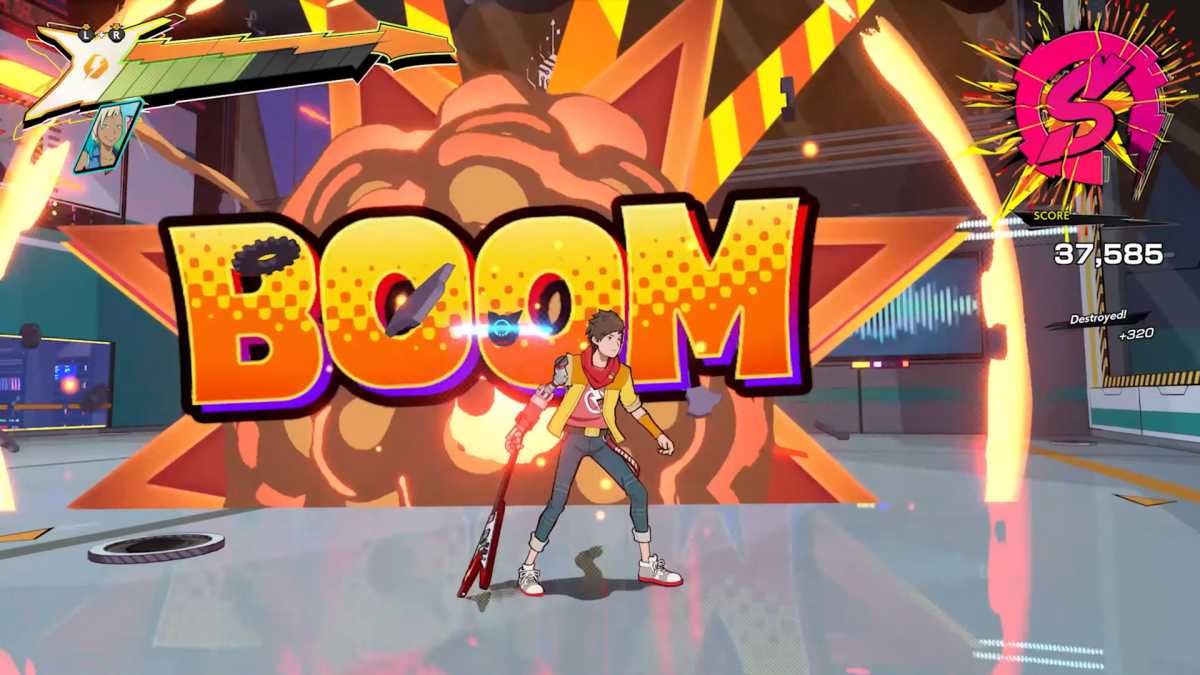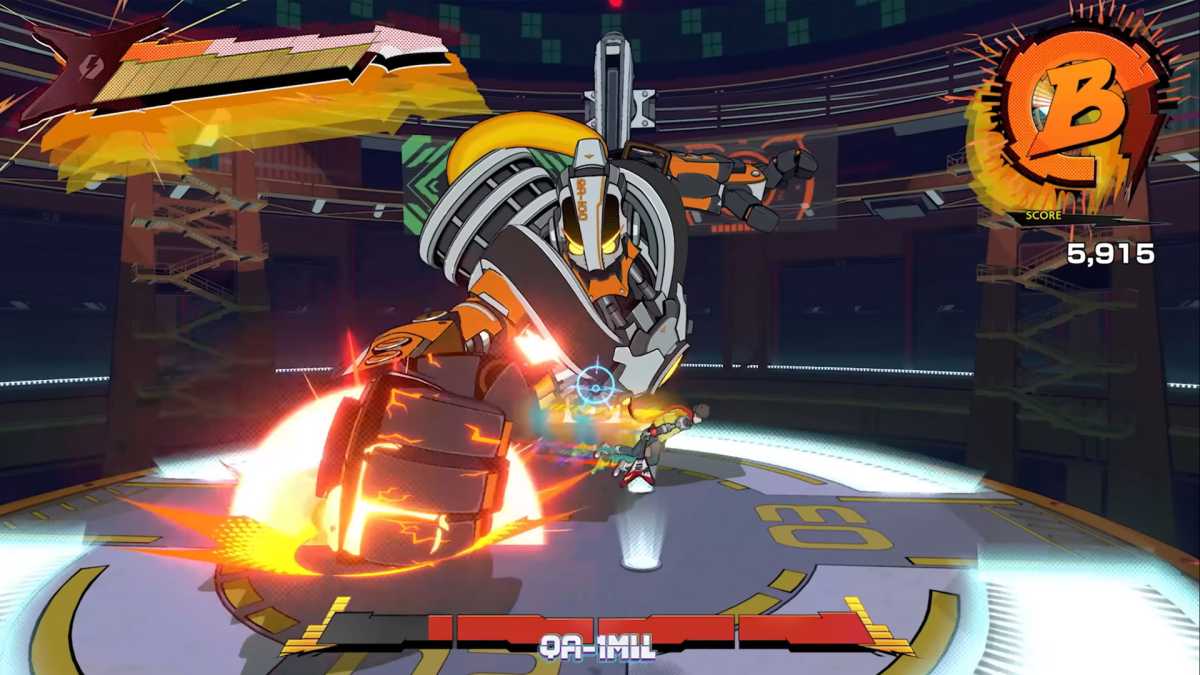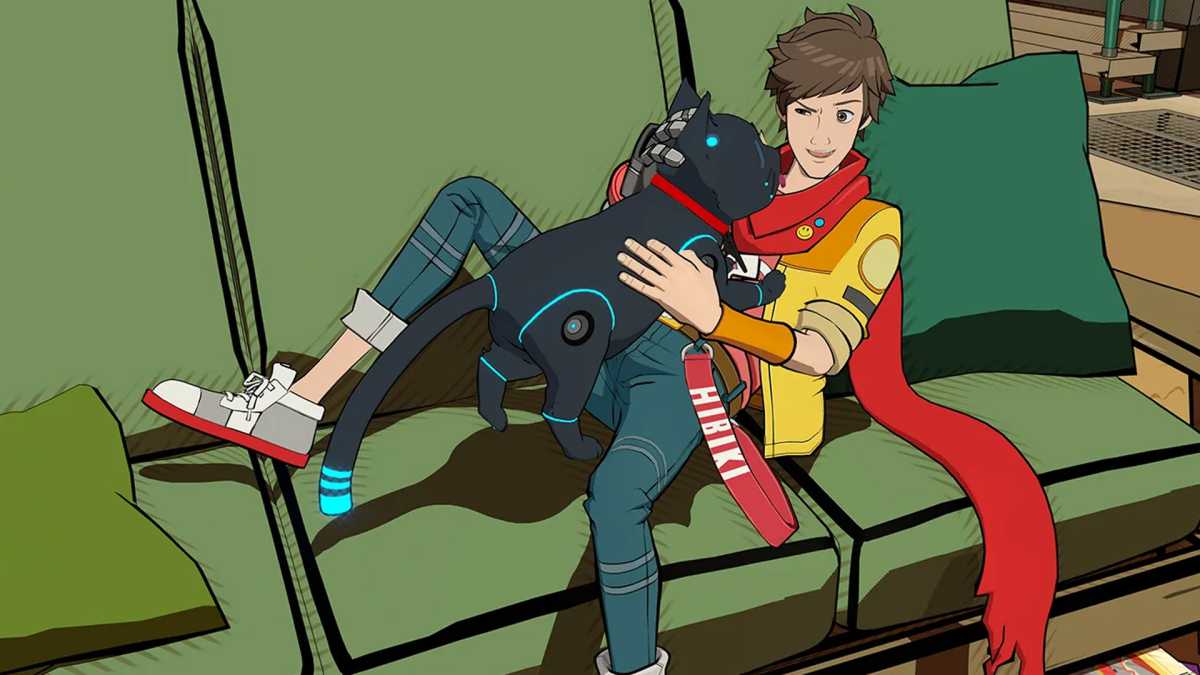Rhythm brawler Hi-Fi Rush oozes flashy personality

 Image: Bethesda Screenshot
Image: Bethesda ScreenshotYesterday’s Xbox Developer Direct presentation was a bit of a staid affair. Another Minecraft spinoff, another Forza, another Elder Scrolls Online expansion, and another preview for vampire shooter Redfall. But there was one standout. Hi-Fi Rush is a pop-rock breath of fresh air, a rhythm-based beat-em-up with all the color and attitude of a post-Pokemon kid’s anime. And you can play it…right now, on PC and Xbox. And it’s launching immediately on Xbox Game Pass. Huh.
Hi-Fi Rush comes from Tango Gameworks, a Japanese studio best known for The Evil Within and Ghotswire: Tokyo. The studio’s horror pedigree is deep, with Resident Evil director Shinji Mikami serving as studio founder and, yes, producer for this game. But if you’re expecting anything dark or frightening from Hi-Fi Rush, you’re in for something far more shocking than a zombie hiding in a locker. It’s is a frenetic beat-em-up in every sense of the word, where you smash cel-shaded robots and bounce around a cartoon world to the rhythm of a power rock soundtrack.
A beat-em-up in every sense
You play Chai, a protagonist who fell right out of a 2000s-era Fox Kids show. This aspiring rockstar has had his arm replaced with a cybernetic trash collector after volunteering for experimental surgery at one of those giant, cartoonishly evil companies that seem to populate the Borderlands universe. When the surgery also implants his off-brand iPad into his chest, Chai gains the power to see the pulse of the world around him, wield a Flying V made out of trash a la Quick-Draw McGraw, and power up his attacks by smashing on the beat.
You can button-mash all you want, but Chai will only strike his foes on the beat
Hi-Fi Rush alternates between basic platforming sections, populated with a bunch of moving platforms and predictably breakable crates, and boxed-off combat arenas filled with robots for you to musically pummel. The latter is where the gameplay shines, giving you a wide selection of tools to wreak rhythmic destruction. You can button-mash all you want, but Chai will only actually strike his foes on the beat: either one beat for the light attack or two for the heavy. You can move, jump, dash, and grapple to your enemies with a little more freedom, but the attack restriction means that most of the gameplay is locked into the beat of the background music. You’ll gain points by striking in time, but won’t lose anything if you miss it — you’ll just do less damage and gain fewer style points than you might have.

Bethesda Softworks
Bethesda Softworks
Bethesda Softworks
It’s a combat system that’s both stylish and forgiving, at least on the default difficulty level. It’s hard to mess things up too badly even in the over-the-top boss fights. That’s especially true once you unlock combo attacks with your Scooby gang of support characters, who can break through shields or soften up impenetrable armor when temporarily summoned. Super attacks and combos make the screen burst into even more vibrant life — and justify the game’s seizure warning.
Platforming sections slow to a crawl
If only the basic enemies had as much variety as your arsenal of attacks. In the first three or four hours of gameplay, I exclusively fought remixed robots in closed-off boxes, with no environmental hazards or arena variation. The bosses offer a bit of a change of pace (literally, since they get remixed versions of licensed songs from bands like Nine Inch Nails and The Black Keys), but also display a depressing lack of imagination. The first big boss is — stop me if you’ve heard this one before — a giant robot that smashes you with its fists, at which point it shows a weak point for you to wail on.

Bethesda Softworks
Bethesda Softworks
Bethesda Softworks
The platforming sections in between combat are likewise uninspired. You’ll bounce and zip around a 3D world that looks gorgeous, but plays like a licensed Pixar game from the PlayStation 2. Every new ability unlock effectively boils down to “press button to continue,” and the jumping physics (which propels you forward at a walking pace and not a bit faster) make actual traversal a chore.
What’s the difference? Presentation!
That might sound like I’m not having fun with Hi-Fi Rush. But I am. Despite the easy combat and the iffy platforming, the game is just bursting with so much personality and prrrrrrrresentation that I can’t help but smile while playing it. The primary colors of the characters and environments constantly punch your eyeballs, in a refreshing change from the cyan-and-pink color pallet indie gaming seems to have been stuck on for the last few years. It’s enabled and artfully enhanced by cel-shading that makes the whole game look like a cartoon.
And the animation. Good grief. Absolutely everything in Hi-Fi Rush bounces to the beat of the music, from the enemies to the backgrounds to Chai and his robot cat-slash-Bluetooth speaker. It has that same kind of visual heartbeat as Cuphead, but with design from a modern cartoon instead of a hundred-year-old Fleischer short. He stomps his trainers to the beat while running around the environments, and taps and snaps his fingers (with an Adam West Batman-style “SNAP” onomatopoeia appearing) even while at rest.
It has that same kind of visual heartbeat as Cuphead
The visuals and music combine for a pop-punk feeling of joy that’s impossible to deny, even if the gameplay itself isn’t innovative. If you don’t find yourself bobbing your head in time to the music after a level or two, you might have to look out for Old Man Trouble. The quippy dialogue is also a bit flat — again, like Borderlands without the swearing — but the voice acting is competent enough that it doesn’t get grating.
Thank goodness it’s on Game Pass
Hi-Fi Rush is $30 on Steam and the Epic Games Store. And based on the first three hours, I’d hesitate to recommend it at that price, unless you’re a big fan of either kid’s anime or rhythm games. But publisher Bethesda is now firmly in Microsoft’s family (at least if the courts don’t force a breakup), so the game has instantly landed on Xbox Game Pass. As a freebie for subscribers, or even a reason to spend $10-15 on a one-month ticket to the library, it’s more than justified.

Bethesda Softworks
Bethesda Softworks
Bethesda Softworks
I should also point out that the game runs great, much more so than you might expect from a title that launches on PC and Xbox at the same time. It animates smooth as butter on my RTX 3070 desktop, and supports my ultrawide monitor’s 21:9 resolution without complaint. After playing several iffy cross-platform releases — looking at you, Elden Ring — it’s a nice change of pace.
Hi-Fi Rush might not be breaking new ground in any area, but its presentation and personality are so appealing that I find it hard to care. Give it a try if you have Game Pass, or bookmark it for the next time you re-up your subscription.
Author: Michael Crider, Staff Writer

Michael is a former graphic designer who’s been building and tweaking desktop computers for longer than he cares to admit. His interests include folk music, football, science fiction, and salsa verde, in no particular order.
Recent stories by Michael Crider:
Hades II’s musical flourishes are a hellish delightCorsair’s next purchase is sim racing specialist FanatecMicrosoft retools the Windows Xbox app to play nicer on handhelds






